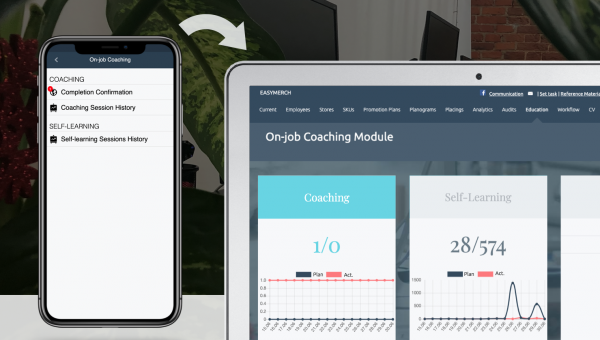Why On-Job Coaching and Why with EasyMerch

We have recently discussed how EasyMerch helps to organize self-learning processes for employees. But you may think: “What about on-the-job coaching?”. The processes of self-education and the means of control are quite clear (a merchandiser learns the materials, completes a test, the manager checks the results). When it comes to coaching, managers tend to face some other problems.
There are two formats of on-the-job coaching for merchandisers:
- A joint visit to a store. This method of coaching allows a coach to clearly explain something, for example, the principles of displaying goods on shelves or the rules of organizing secondary placements.
- Back-check. This method of coaching does not imply a joint visit to a store. The coach may check the merchandiser’s reports on their computer and make an assessment or duplicate the merchandiser’s visit on the next day taking the same route and check how the visit has been done. In each case questionnaires to be filled in by the coach differ. It depends on what assessment criteria are set. For example, when the coach makes a joint visit with the merchandiser, the coach may test a merchandiser’s ability to make small talk with people whereas it’s impossible when the coach duplicates a merchandiser’s visit on the next day.
The above processes are hard to be controlled from the manager’s side. The coach and the merchandiser may make a deal to draw up the papers and not even start an actual coaching session at all.
EasyMerch allows managers to control coaching session conduction. After each session the employees have to fill in detailed reports with photos, and their location is registered and saved in the system automatically.
Moreover, managers get access to analytical data: they are able to control the employees’ level of knowledge, check which skills are well developed and which skills still need to be improved. When another coaching session is finished, managers may start planning and assigning the next ones.
Whereas, coachees get a detailed report on their skills, where the coach makes an assessment of their work and specify their strengths and weaknesses.
